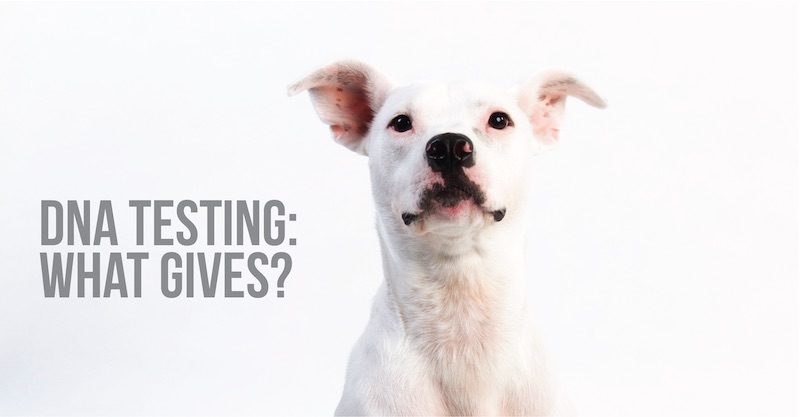Dogs come in all shapes and sizes: small dogs and giant dogs, short dogs and tall dogs, dogs with tail nubbins, dogs with webbed toes, and dogs with flat faces. There are lap dogs and floor dogs, athletes and couch potatoes, and even dogs with very specific skillsets (like the truffle-hunting Lagotto Romagnolo).
The rising popularity of rescuing animals rather than buying a specific breed has left pet owners to ask: “just what kind of dog do I have?” There are plenty of people that are happy having a mystery mutt. But there are also people that crave the satisfaction of knowing which breeds make up their furry friend.
Enter: DNA Testing
More and more pet parents are sending in for a detailed report of their pet’s genetic makeup, excited to find out just how much lab is actually in their “lab mix”. But what if there was more to DNA testing? What if people took the results from their dog’s DNA test and built a health and wellness plan based on the predisposed genetic problems of the resulting breeds?
At Herbsmith, we think the biggest advantage of DNA testing is in knowing exactly what unique mix of breeds make up your beautiful pup, so that you can make educated health decisions based on those results. Imagine you adopted a puppy from your local humane society. Their best guess for breed was ‘Cattle Dog/Australian Shepherd mix’, but you’re curious exactly what breeds are represented in Fido, so you have decided to swab his cheek and send it in for testing!
Six weeks later, Fido’s DNA test comes back as a mix of:
And this information may give us some insight into the health problems Fido may be predisposed to...
Check out each breed’s commonly seen health problems below.
Health issues commonly seen in Australian Cattle Dogs are: progressive retinal atrophy (PRA), canine hip dysplasia (CHD), elbow dysplasia, deafness, and Osteochondrosis Dissecans (OCD), lens luxation, cataracts, von Willebrand’s Disease (vWD), and Persistent Pupillary Membrane (PPM).
Health issues commonly seen in Great Pyrenees dogs are: entropion, osteosarcoma, Osteochondrosis Dissecans (OCD), skin problems, cataracts, chondrodysplasia, panosteitis, canine hip dysplasia (CHD), patellar luxation, spinal muscular atrophy, gastric torsion, and otitis externa.
Health issues commonly seen in Poodles are: trichiasis, entropion, distichiasis, cataract, glaucoma, lacrimal duct atresia and major concerns such as progressive retinal atrophy (PRA), epilepsy, Legg Perthes disease, patellar luxation, gastric torsion, Addison’s disease, sebaceous adenitis, epilepsy, cataract, and canine hip dysplasia (CHD).
Now that we know which breeds Fido is a mix of (and after doing an extensive Google search on what the heck all of those are), we have an idea of possible health problems to look for. Don’t freak out: just because these are common issues for the breeds in Fido, doesn’t mean he’s going to be afflicted by them. And on the flipside, he may run into a disease in his lifetime that isn’t on the list of health concerns for the breeds in his genes. This list at least gives us some insight into how we can help Fido before he even needs it.
So, based on the lists, the biggest health problems that Fido could face are eye issues and joint issues. You (a caring pet parent) have decided to be proactive in Fido’s care, so that his eyes and joints can remain happy and healthy for as long as possible, and you seek out some helpful vision support and joint support supplements at your local pet store.
—
The kind folks over at Embark Veterinary have provided us with one of their [very] nifty DNA tests so that we can show you how to put a health and wellness plan into place with a real-life example (no offense to Fido). When we originally decided to do this mini-series on DNA testing, Embark Veterinary was the clear choice of test to go with. They’re partnered with the Cornell University College of Veterinary Medicine and the test checks not only for breeds, but also for genetic diseases (more than 160 of them to be exact) and physical traits (like size for example, so you can have an idea of where Fido will fall on the scale of teeny-tiny to ridiculously large). Embark’s DNA test looks to be the most comprehensive DNA test out there for dogs and we are excited to try it!
We think Willie looks kind of like a Pitbull Terrier, but also kind of like a Dalmatian. But then if you really look at him for awhile, he starts to look like Bartok, the white bat from Anastasia.




We’ve just received Willie’s Embark DNA Test and we can’t contain our excitement! Join us again in approximately 6 to 8 weeks – we’ll do a fun breed reveal post with Willie as well as talk about some of the potential health problems that come back with his DNA test! In the meantime, take a guess! What breeds do you think Willie looks most like?








